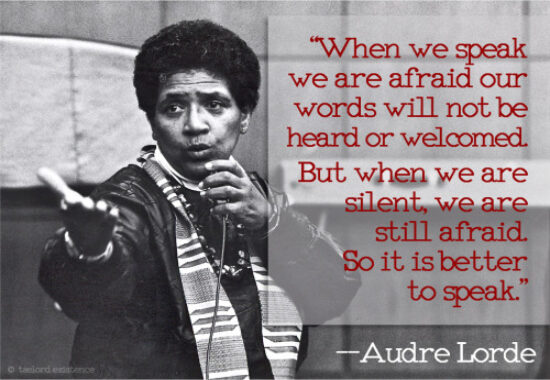By Becca Howe, TRJ Parent
Audre Lorde was a Black poet, essayist, and activist, whose work is celebrated for its honesty, raw emotion, and powerful imagery. She has had a profound impact on literature, feminism and resilience, especially her consistent emphasis on the importance of recognizing the interconnected nature of different forms of oppression, such as racism, sexism, homophobia, and classism. Known now as intersectionality, Lorde’s insights have had a profound impact on contemporary discussions of social justice and activism.
Lorde was born on February 18, 1934, in New York City, and was legally blind from birth. She did not speak until she learned to read at age four. She grew up in Harlem, known for its rich cultural history and vibrant community, which played a significant role in shaping Lorde’s identity and worldview, as it was a center of African American culture and activism during her formative years.
Through her work, Lorde gave voice to the experiences of marginalized individuals, and she often explored themes of disability and self-acceptance. She challenged dominant narratives and advocated for social change. Lorde was known for her warmth, empathy and ability to connect with others. She was a mentor and inspiration to many, especially within the LGBTQ+ and feminist communities.
A quote from her essay, “The Transformation of Silence into Language and Action,” expresses a contemporary theme that many people today are unpacking in their own lives: “Your silence will not protect you.” This powerful statement encapsulates Lorde’s belief in the importance of speaking out against injustice and oppression. She emphasized the need for marginalized individuals to use their voices to challenge systems of power and advocate for change, even in the face of resistance or fear.
In 1978, Lorde spoke at the National Women’s Conference in Houston, Texas. Her powerful speech titled, “The Master’s Tools Will Never Dismantle the Master’s House,” became one of her most famous and influential works. In this speech, Lorde addressed issues of racism, sexism, homophobia, and classism within the feminist movement, calling for greater inclusivity and solidarity among women of different backgrounds. Her speech challenged the predominantly white and middle-class feminist movement to recognize and address the intersecting oppressions faced by women of color, LGBTQ+ individuals and other marginalized groups. Lorde’s contribution to the conference marked a pivotal moment in the feminist movement, sparking important conversations about diversity, intersectionality, and social justice that continue to resonate today.

